- Clone
- R1-2 (See other available formats)
- Regulatory Status
- RUO
- Other Names
- α4 integrin, VLA-4 α chain, integrin α4, ITGA4
- Isotype
- Rat IgG2b, κ
- Ave. Rating
- Submit a Review
- Product Citations
- publications
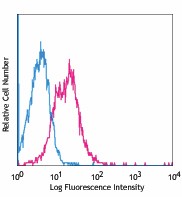
-

C57BL/6 splenocytes stained with R1-2 FITC
| Cat # | Size | Price | Save |
|---|---|---|---|
| 103605 | 50 µg | ¥14,780 | |
| 103606 | 500 µg | ¥52,160 |
CD49d is a 150 kD glycoprotein, also known as α4 integrin or VLA-4 α chain. It is a member of the integrin family, expressed on T and B cells, monocytes, eosinophils, basophils, mast cells, thymocytes, NK cells, and dendritic cells. CD49d is a heterodimer expressed with either of two β chains, β1 (CD29) or β7, to form the VLA-4 (integrin α4β1) or LPAM-1 (integrin α4β7) complexes. CD49d plays a critical role in adhesion and T cell costimulation. The primary ligands for CD49d are VCAM-1, MAdCAM-1, and fibronectin.
Product DetailsProduct Details
- Verified Reactivity
- Mouse
- Antibody Type
- Monoclonal
- Host Species
- Rat
- Immunogen
- AKR/Cum mouse spontaneous T lymphoma line TK1
- Formulation
- Phosphate-buffered solution, pH 7.2, containing 0.09% sodium azide.
- Preparation
- The antibody was purified by affinity chromatography, and conjugated with FITC under optimal conditions.
- Concentration
- 0.5 mg/ml
- Storage & Handling
- The antibody solution should be stored undiluted between 2°C and 8°C, and protected from prolonged exposure to light. Do not freeze.
- Application
-
FC - Quality tested
- Recommended Usage
-
Each lot of this antibody is quality control tested by immunofluorescent staining with flow cytometric analysis. For flow cytometric staining, the suggested use of this reagent is ≤1.0 µg per million cells in 100 µl volume. It is recommended that the reagent be titrated for optimal performance for each application.
- Excitation Laser
-
Blue Laser (488 nm)
- Application Notes
-
The R1-2 antibody has been shown to partially block CD49d mediated interactions and, in combination with the 9C10 (MFR4.B) antibody, completely blocks VCAM-1 binding to VLA-4. Additional reported applications (for the relevant formats) include: in vitro and in vivo blocking of cell-cell adhesion and T cell costimulation1-4, immunoprecipitation1, and immunohistochemistry of frozen sections5. The Ultra-LEAF™ purified antibody (Endotoxin < 0.01 EU/µg, Azide-Free, 0.2 µm filtered) is recommended for functional assays (Cat. No. 103629 and 103630).
-
Application References
(PubMed link indicates BioLegend citation) -
- Holzmann B, et al. 1989. Cell 56:37. (IP, Block)
- Ferguson TA, et al. 1993. J. Immunol. 150:1172. (Block)
- Andrew DP, et al. 1994. J. Immunol. 153:3847. (Block)
- Kilshaw PJ, et al. 1991. Eur. J. Immunol. 21:2591. (Block)
- Jaspers M, et al. 1995. Differentiation 59:79. (IHC)
- Lawson BR, et al. 2007. J. Immunol. 178:5366. (FC)
- Product Citations
-
- RRID
-
AB_313036 (BioLegend Cat. No. 103605)
AB_313036 (BioLegend Cat. No. 103606)
Antigen Details
- Structure
- Integrin family, associates with integrin β1 or β7, 150 kD
- Distribution
-
T cells and B cells, monocytes, eosinophils, basophils, mast cells, thymocytes, NK cells, dendritic cells
- Function
- T cell costimulation, cell-cell and cell-matrix adhesion
- Ligand/Receptor
- VCAM-1, MAdCAM-1, fibronectin
- Cell Type
- B cells, Basophils, Dendritic cells, Eosinophils, Mast cells, Monocytes, NK cells, T cells, Thymocytes, Tregs
- Biology Area
- Cell Adhesion, Cell Biology, Immunology, Innate Immunity
- Molecular Family
- Adhesion Molecules, CD Molecules
- Antigen References
-
1. Barclay AN, et al. 1997. The Leukocyte Antigen FactsBook Academic Press.
2. Lobb RR, et al. 1994 J. Clin. Invest. 94:1722.
3. Berlin C, et al. 1993. Cell 74:185.
4. Maguire JE, et al. 1995. J. Exp. Med. 182:2079. - Gene ID
- 16401 View all products for this Gene ID
- UniProt
- View information about CD49d on UniProt.org
Related FAQs
Other Formats
View All CD49d Reagents Request Custom Conjugation| Description | Clone | Applications |
|---|---|---|
| Biotin anti-mouse CD49d | R1-2 | FC |
| FITC anti-mouse CD49d | R1-2 | FC |
| PE anti-mouse CD49d | R1-2 | FC |
| Alexa Fluor® 488 anti-mouse CD49d | R1-2 | FC |
| Alexa Fluor® 647 anti-mouse CD49d | R1-2 | FC |
| PE/Cyanine7 anti-mouse CD49d | R1-2 | FC |
| PerCP/Cyanine5.5 anti-mouse CD49d | R1-2 | FC |
| APC anti-mouse CD49d | R1-2 | FC |
| TotalSeq™-A0078 anti-mouse CD49d | R1-2 | PG |
| APC/Fire™ 750 anti-mouse CD49d | R1-2 | FC |
| PE/Dazzle™ 594 anti-mouse CD49d | R1-2 | FC |
| Ultra-LEAF™ Purified anti-mouse CD49d | R1-2 | FC,IP,Block,IHC-F |
| TotalSeq™-B0078 anti-mouse CD49d | R1-2 | PG |
| TotalSeq™-C0078 anti-mouse CD49d | R1-2 | PG |
| APC/Cyanine7 anti-mouse CD49d | R1-2 | FC |
| Brilliant Violet 785™ anti-mouse CD49d | R1-2 | FC |
| Spark Blue™ 550 anti-mouse CD49d (Flexi-Fluor™) | R1-2 | FC |
| Spark Blue™ 574 anti-mouse CD49d (Flexi-Fluor™) Antibody | R1-2 | FC |
| Spark Red™ 718 anti-mouse CD49d (Flexi-Fluor™) | R1-2 | FC |
Customers Also Purchased
Compare Data Across All Formats
This data display is provided for general comparisons between formats.
Your actual data may vary due to variations in samples, target cells, instruments and their settings, staining conditions, and other factors.
If you need assistance with selecting the best format contact our expert technical support team.
-
Biotin anti-mouse CD49d
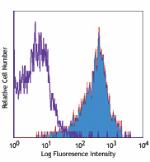
C57BL/6 mouse splenocytes stained with biotinylated R1-2, fo... -
FITC anti-mouse CD49d
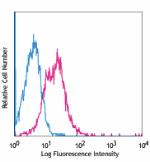
C57BL/6 splenocytes stained with R1-2 FITC -
PE anti-mouse CD49d
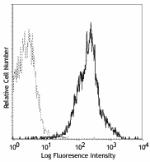
C57BL/6 splenocytes stained with R1-2 PE -
Alexa Fluor® 488 anti-mouse CD49d
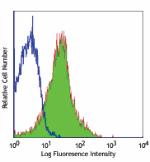
C57BL/6 mouse splenocytes stained with R1-2 Alexa Fluor® 488 -
Alexa Fluor® 647 anti-mouse CD49d
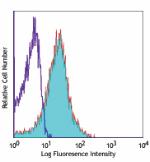
C57BL/6 mouse splenocytes stained with R1-2 Alexa Fluor® 647 -
PE/Cyanine7 anti-mouse CD49d
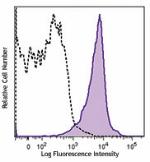
C57BL/6 mouse splenocytes were stained with CD49d (clone R1-... -
PerCP/Cyanine5.5 anti-mouse CD49d
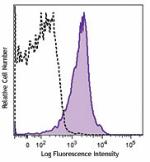
C57BL/6 mouse splenocytes were stained with CD49d (clone R1-... -
APC anti-mouse CD49d
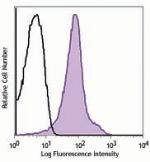
C57BL/6 mouse splenocytes were stained with CD49d (clone R1-... -
TotalSeq™-A0078 anti-mouse CD49d
-
APC/Fire™ 750 anti-mouse CD49d
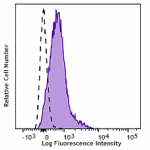
C57BL/6 mouse splenocytes were stained with CD49d (clone R1-... -
PE/Dazzle™ 594 anti-mouse CD49d
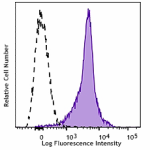
C57BL/6 mouse splenocytes were stained with CD49d (clone R1-... -
Ultra-LEAF™ Purified anti-mouse CD49d
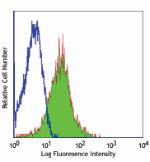
C57BL/6 mouse splenocytes stained with Ultra-LEAF™ purified ... -
TotalSeq™-B0078 anti-mouse CD49d
-
TotalSeq™-C0078 anti-mouse CD49d
-
APC/Cyanine7 anti-mouse CD49d

C57BL/6 mouse splenocytes were stained with anti-mouse CD3 F... -
Brilliant Violet 785™ anti-mouse CD49d

C57BL/6 mouse splenocytes were stained with anti-mouse CD3 (... -
Spark Blue™ 550 anti-mouse CD49d (Flexi-Fluor™)
-
Spark Blue™ 574 anti-mouse CD49d (Flexi-Fluor™) Antibody
-
Spark Red™ 718 anti-mouse CD49d (Flexi-Fluor™)












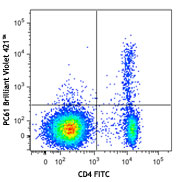
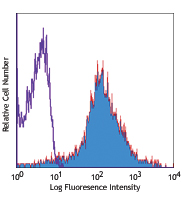
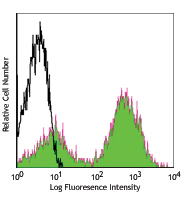
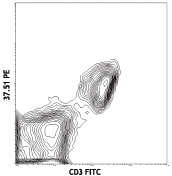



Follow Us